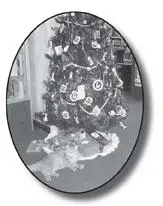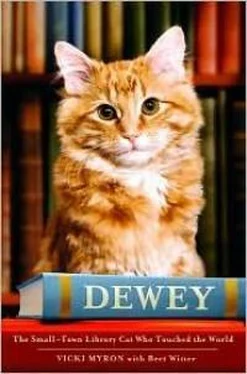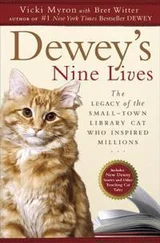Work, school, home life, petty local politics, I did what I always did in times of stress: I took a deep breath, dug inside, and forced myself to stand up taller than ever before. I had been picking myself up by my bootstraps all my life. There wasn’t anything about this situation, I told myself, that I couldn’t handle. It was only late at night in the library, alone with my thoughts and staring at that blank computer screen, that I began to feel the pressure. It was only then, in my first quiet moment of the day, that I felt my foundation begin to shake.
A library after closing is a lonely place. It is heart-poundingly silent, and the rows of shelves create an almost unfathomable number of dark and creepy corners. Most of the librarians I know won’t stay alone in a library after closing, especially after dark, but I was never nervous or scared. I was strong. I was stubborn. And most of all, I was never alone. I had Dewey. Every night, he sat on top of the computer screen as I worked, lazily swiping his tail back and forth. When I hit a wall, either from writer’s block, fatigue, or stress, he jumped down into my lap or onto the keyboard. No more, he told me. Let’s play. Dewey had an amazing sense of timing.
“All right, Dewey,” I told him. “You go first.”
Dewey’s game was hide-and-seek, so as soon as I gave the word he would take off around the corner into the main part of the library. Half the time I immediately spotted the back half of a long-haired orange cat. For Dewey, hiding meant sticking your head in a bookshelf; he seemed to forget he had a tail.
“I wonder where Dewey is,” I said out loud as I snuck up on him. “Boo!” I yelled when I got within a few feet, sending Dewey running.
Other times he was better hidden. I would sneak around a few shelves with no luck, then turn the corner to see him prancing toward me with that big Dewey smile.
You couldn’t find me! You couldn’t find me!
“That’s not fair, Dewey. You only gave me twenty seconds.”
Occasionally he curled up in a tight spot and stayed put. I’d look for five minutes, then start calling his name. “Dewey! Dewey!” A dark library can feel empty when you’re bending over between the stacks and looking through rows of books, but I always imagined Dewey somewhere, just a few feet away, laughing at me.
“All right, Dewey, that’s enough. You win!” Nothing. Where could that cat be? I’d turn around and there he was, standing in the middle of the aisle, staring at me.
“Oh, Dewey, you clever boy. Now it’s my turn.”
I’d run and hide behind a bookshelf, and invariably one of two things happened. I’d get to my hiding place, turn around, and Dewey would be standing right there. He had followed me.
Found you. That was easy.
His other favorite thing to do was run around the other side of the shelf and beat me to my hiding spot.
Oh, is this where you’re thinking about hiding? Because, well, I’ve already figured it out.
I’d laugh and pet him behind the ears. “Fine, Dewey. Let’s just run for a while.”
We’d run between the shelves, meeting at the end of the aisles, nobody quite hiding and no one really seeking. After fifteen minutes I would completely forget my research paper, or the most recent budget meeting for the remodeling project, or that unfortunate conversation with Jodi. Whatever had been bothering me, it was gone. The weight, as they say, was lifted.
“Okay, Dewey. Let’s get back to work.”
Dewey never complained. I’d climb back into my chair, and he’d climb back to his perch on top of the computer and start waving his tail in front of the screen. The next time I needed him, he’d be there.
It’s not a stretch to say those games of hide-and-seek with Dewey, that time spent together, got me through. Maybe it would be easier, right now, to tell you Dewey put his head on my lap and whimpered while I cried or that he licked the tears from my face. Anyone can relate to that. And it is almost true, because sometimes when the ceiling started falling in on me and I found myself staring blankly down at my lap, tears in my eyes, Dewey was there, right where I needed him to be.
But life isn’t neat and tidy. Our relationship can’t be tied up with a few tears. I’m not much of a crier, for one thing. And while Dewey was demonstrative with his love—he was always a soft touch for a late-night cuddle—he didn’t bathe me with affection. Somehow Dewey knew when I needed a little nudge or a warm body, and he knew when the best thing for me was a stupid, mindless game of hide-and-seek. And whatever I needed, he’d give me, without thought, without wanting something in return, and without me asking. It wasn’t just love. It was more than that. It was respect. It was empathy. And it went both ways. That spark Dewey and I had felt when we met? Those nights alone together in the library turned it into a fire.
I guess my final answer is that when everything in my life was so complex, when things were sliding in so many directions at once and it seemed at times the center wouldn’t hold, my relationship with Dewey was so simple, and so natural, and that’s what made it so right.
Chapter 12
Christmas

Christmas is a holiday the town of Spencer celebrates together. It’s the slow season for the farmers and manufacturers, a time to relax and spread our collected coins around to the merchants. The activity of the season is the Grand Meander, a walking tour of Grand Avenue that begins the first weekend in December. The whole street is strung with white lights, a coordinated display that shows off the fine lines of our buildings. Christmas music is piped in; Santa Claus comes out to receive wish lists from the children. His elves, also in Santa suits, ring bells on corners and collect coins for charities. The whole town is out, laughing, talking, clutching one another to share the warmth. The stores stay open late, showing off their holiday selections and offering cookies and hot chocolate to fight off the biting cold.
Every storefront window is decorated. We call them Living Windows, because in each one local residents act out holiday scenes. The Parker Museum, which houses a collection of Clay County artifacts, including a fire truck that battled the great fire of 1931, always creates a variation on the pioneers’ Christmas. Other windows offer interpretations of Christmases not quite so long past, with Radio Flyers and porcelain dolls. Some have mangers. Others feature toy tractors and cars, a boy’s view of Christmas morning. You can’t look at the windows, playful or touching, funny or serious, and not think of the hundred fifty previous meanders up and down this stretch of stores, and the next hundred fifty to come. This, the windows all say, is Spencer.
The Festival of Trees, a Christmas-tree decorating contest, is held on the corner of First Avenue and Fifth Street, inside what used to be the Spencer Convention Center but is now the Eagles Club, a military-related social club that holds dances and dinners to raise money for charity. Since 1988 was Dewey’s first Christmas, the library entered a tree under the title Do-We Love Christmas? The tree was decorated with—what else?—pictures of Dewey. It also featured puffy kitten ornaments and garlands of red yarn. The presents under the tree were appropriate books, like The Cat-a-log and The Cat in the Hat , tied in neat red bows. Visitors could wander through the trees for a small charitable donation. There was no official judging, but I don’t think it’s a stretch to say Do-We Love Christmas? was the winner, hands down.
Читать дальше













